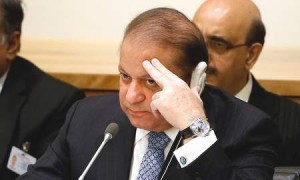Financial Times
Farhan Bokhari
 Hours before Pakistan’s prime minister, Nawaz Sharif, addressed the nation after his children’s offshore assets were revealed in the Panama Papers, Salim Khan echoed a widely held view.
Hours before Pakistan’s prime minister, Nawaz Sharif, addressed the nation after his children’s offshore assets were revealed in the Panama Papers, Salim Khan echoed a widely held view.
“I bribe traffic police at least thrice a week. Everyone takes bribes, from police and office workers to our rulers,” the Islamabad taxi driver said. “The people at the top never get caught for corruption. Why should that be different now?”
But while ordinary Pakistanis are resigned to the daily reality of graft, the timing of the revelations has proved awkward for Mr Sharif. The prime minister also faces fallout from a widening campaign against militants, disagreements with the country’s Islamic leaders, and a powerful army chief who is rising in influence and popularity.
“Nawaz Sharif is now clearly under siege and the Panama Papers can work as a trigger for his political opponents to raise the pressure,” says Hasan Askari Rizvi, a respected political commentator.
Cricketer turned opposition politician Imran Khan has led the charge, demanding an independent investigation into the source of the wealth of Mr Sharif’s children.
Mr Khan wrote in a tweet: “Only reason ppl open offshore accts through Panama is to either hide wealth, esp ill-gotten wealth, or to evade tax or both.” He is seeking full public disclosure as to whether the money channelled through the offshore accounts of Mr Sharif’s children was initially sent from Pakistan without paying local taxes.
Mr Sharif insists his sons acquired property near London’s Hyde Park with money legitimately raised from selling the family’s steel business in Saudi Arabia.
Public perceptions of the country’s first family contrast sharply with that of Raheel Sharif, the popular and powerful army chief, who last week dismissed six military officers including two generals for corruption, and who has called for a wider crackdown on graft.
“Enduring peace and stability [will not be established] unless the menace of corruption is uprooted,” General Sharif, who is no relation to the country’s leader, said in a widely reported speech to his troops last week.
Some analysts say that with Gen Sharif’s popularity already on the rise after a major campaign against crime in the southern city of Karachi, any further undermining of the prime minister’s position may raise the spectre of a return to army rule in a country that has spent roughly half its seven decades of existence as a military dictatorship.
“There is a dilemma faced by our democracy,” says Talat Masood, a former military commander and commentator on national affairs. “As public awareness grows [over the Panama Papers revelations], our democracy will be seen to weaken in the eyes of our people and [the army] will become stronger.”
But the spotlight on Mr Sharif’s family comes as other threats to his authority emerge in his political base of Punjab, home to more than 60 per cent of the country’s population.
Following a terrorist attack late last month on a children’s park in Lahore, Mr Sharif has been forced to agree to a politically risky army-led campaign against Islamist militants in the province. He and his younger brother Shahbaz Sharif, Punjab’s chief minister, had previously resisted such action.
“There is a major risk of the battle [against extremists] spreading to cities that are calm right now,” says one senior provincial official. “The violence will inevitably make the ruling party unpopular.”
Meanwhile, Punjab’s hardline Islamists have challenged Mr Sharif on two fronts.
First, thousands of angry Islamists protested late last month against the execution of a policeman who had assassinated an influential politician opposed to the country’s blasphemy laws. Malik Mumtaz Qadri killed Salman Taseer, governor of Punjab province, in 2011 and defended his act on the grounds Taseer had defended a Christian woman sentenced to death for blasphemy. Some of the leaders of that protest have threatened to organise more.
Second, mullahs have reacted angrily to a move by Mr Sharif’s ruling party to create a new Punjabi law for the protection of women, which they say runs contrary to the country’s traditions.
“Nawaz Sharif is following a western agenda,” says one cleric. “His government wants to be seen protecting women only to please the Americans and Europeans.”
Mr Rizvi says Pakistan’s prime minister has become more vulnerable as he faces this confluence of problems.
“Nawaz Sharif’s future is becoming increasingly unpredictable as he faces growing opposition,” he says. “The situation can go either way.”



